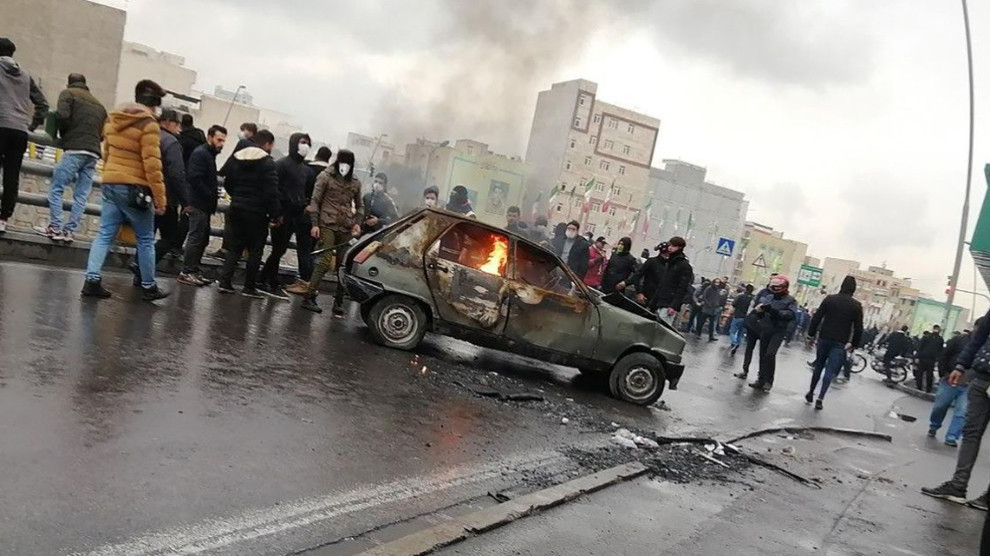UN: At least 7,000 people arrested in Iran in mass protests
UN’s Bachelet called on Iran to address multiple human rights violations in context of recent protests.
UN’s Bachelet called on Iran to address multiple human rights violations in context of recent protests.

As more information gradually filters out of Iran in the wake of the recent protests, the UN High Commissioner for Human Rights Michelle Bachelet on Friday expressed alarm at the continuing lack of transparency about casualties and the treatment of thousands of detainees, as well as continuing arrests reported to be taking place across the country.
At least 7,000 people have reportedly been arrested in 28 of Iran’s 31 provinces since mass protests broke out on 15 November, and the High Commissioner said she is “extremely concerned about their physical treatment, violations of their right to due process, and the possibility that a significant number of them may be charged with offences that carry the death penalty, in addition to the conditions under which they are held.”
During the five days of demonstrations, which according to official Government sources involved between 120,000 and 200,000 protestors, the UN Human Rights Office has information suggesting that at least 208 people were killed, including 13 women and 12 children. There are also reports, which the UN Human Rights Office has so far been unable to verify, suggesting more than twice that number killed.
“In such circumstances, with so many reported deaths, it is essential the authorities act with far greater transparency,” Bachelet said. “They must undertake prompt, independent and impartial investigations into all violations that have taken place, including the killing of protesters and reported deaths and ill-treatment in custody. And those responsible must be held accountable. There appear to be multiple violations of the International Covenant on Civil and Political Rights, which Iran has ratified and is obliged to uphold.”
Security forces responded to the protests with water cannon, tear gas, batons, and in some cases live ammunition against unarmed demonstrators who posed no imminent threat of death or serious injury. According to reports, members of the Basij militia and the Islamic Revolutionary Guard Corps (IRCG) were involved in shooting protestors.
“Verified video footage indicates severe violence was used against protesters, including armed members of security forces shooting from the roof of a justice department building in one city, and from helicopters in another,” Bachelet said. “We have also received footage which appears to show security forces shooting unarmed demonstrators from behind while they were running away, and shooting others directly in the face and vital organs – in other words shooting to kill. These are clear violations of international norms and standards on the use of force, and serious violations of human rights.”
In what appears to be one of the worst incidents, which took place on 18 November, the High Commissioner said her Office had received information partially corroborating reports that Iranian security forces used machine guns against protesters in Jarahi Square in Mahshahr – including against people fleeing the area and people hiding in nearby reed-beds – resulting in at least 23 people killed, and possibly many more.
As well as protestors, it is reported that bystanders in the street and people watching from their homes were also hit with bullets during the Mahshahr incident. “There are conflicting reports about whether or not there were one or more armed people among the protestors,” Bachelet said. “But this does not in any way justify such an indiscriminate, horrifying and deadly reaction by the security forces.”
The UN Human Rights Office has received numerous reports of ill-treatment against those arrested, including with the apparent aim of extracting forced confessions, and State television has broadcast the “confessions” of some detainees alleged to be protest leaders and people affiliated with anti-government groups or foreign States. According to the deputy chief of the IRGC, those who have “openly confessed they were doing mercenary work” will face severe punishment.
“Many of the arrested protesters have not had access to a lawyer, meaning due process is not being respected,” Bachelet said. “We also have reports of severe overcrowding and harsh conditions in detention centres, which in some cities include military barracks, sports venues and schools in addition to official detention facilities. There are also reports that individuals who were wounded or otherwise injured during the crackdown are being denied medical treatment in detention.”
She expressed concern at reports of intimidation of journalists trying to report on the situation both inside and outside the country, with family members of Iranian journalists working for news channels based outside Iran reportedly summoned and threatened with reprisals by intelligence officials.
“All in all, the picture now emerging from Iran is extremely disturbing,” Bachelet said. “I urge the authorities to immediately release from detention all protestors who have been arbitrarily deprived of their liberty, and to ensure their right to due process, including access to a lawyer of their choosing during the investigative stage. In the event of further protests, I urge the Government to respect Iranians’ right to exercise freedom of expression, peaceful assembly and association and, in addition to investigating the violations that have already occurred, to restrict the use of force to the greatest extent possible, as provided for under the relevant international norms and standards.”